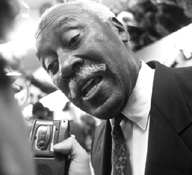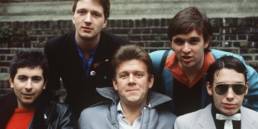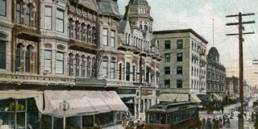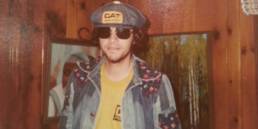

Nate Holden, who has weathered more storms in his career than Ferdinand Magellan, looks ready to drop. Eyes bloodshot, hands limp at his side, the man legendary for knocking out one-arm pushups and puzzling zingers, slumps deep into an office chair, muttering gravelly shoptalk into the phone.
Just past lunchtime on a recent Tuesday, the shiny-domed maverick seems all of his 73 years, still physically imposing, still defiant, but somehow lost with no challenge at hand – except becoming private citizen Nate Holden. The public Nate Holden seems nervous about that role. By month’s end, his four stints on the Los Angeles City Council and a nearly 30-year political life that elevated him from his native Georgia to the power corridors of California politics will be dust.
If he’s dreaming of tropical vacations or redeeming lost sleep, it doesn’t show. What ethical hullabaloos and shifting demographic faultlines never did – bounce him from his 10th district reign – terms limits finally have. You get the sense he’s disoriented about being shooed off the public stage so peacefully.
Nudged aside, Holden will have to forsake to his love of combat – a love that propelled him as a teenaged boxer, into the U.S. Army and into some singularly Nate newspaper headlines once in office. Adept with the haymaker, a recipient of punches himself for improprieties, he’ll jab no more. Not for his people.
“I don’t have an option,” he said, massaging his squiggly brow, “For all these years, I’ve lived and breathed this. I have to be in a frame of mind [that] there is a beginning and the end.”
In Los Angeles, where council government isn’t the contact sport it is in Chicago and New York, Holden was like few others. He was colorful and iconoclastic, shrewd and self-destructive, outrageous and just plain out-there. The city may never see someone like him again in the age of packaged, cautious candidates always thinking past their next term limit.
Political observers are divided about his legacy. Was he Crenshaw Boulevard’s Huey Long, or a poor-man’s Willie Brown? Was he badly misunderstood, a great political mind in a mortal skin? Or, did he fizzle out when his rival and energizer – Tom Bradley – exited the scene, and incumbency put a price tag on his idealism?
“He was like the Howard Stern of politics,” said lobbyist Howard Sunkin. “He wasn’t embarrassed about saying what others were afraid to. He was as shrewd as there was. [People] say ‘God bless him’ and ‘God damn him’ at the same time.”
In recent years, Holden’s influence waned on a new-generation council. His antics marginalized him into something of a political curiosity, a flamethrower looking for a target. But he never forgot what his mentor, the late County Supervisor Kenneth Hahn taught him: fix the potholes and the rest will fix itself.
And he was never a yawn.
As Los Angeles burned in the ’92 riots, Holden was the holdout vote against ousting LAPD Chief Daryl Gates because he thought the firing “process” had been short-circuited. Six years later he called a packed news conference to announce the Raiders were returning to the Coliseum from Oakland, which was news to team owner Al Davis.
Who can forget him branding two colleagues as “Westside Ku Klux Klansmen,” or his insistence that a Valley pug dog had been skinned by sadists, and a bin of other left-field denunciations leaving onlookers asking, “Did he really say that?” All the while he exhibited a Clintonian deftness for putting himself in one seemingly impossible moral abyss after another, only to climb out and preen before his enemies, less powerful yet still intact.
L.A. should’ve known what they were getting. Holden had barely been representing his mid-city district a few years when then-Valley Councilman Joy Picus told him, in Holden’s words, “to stop acting like the emperor.”
But gag him? Please. In 1991, he proposed legislation that all restaurant workers get AIDS-tested every six months. Imagine, Holden explained to the press, that a waiter’s tainted blood gets on your glass, adding, “You’re dead as a donut.” Instead, his proposal ended up dead, though it did provoke important debate. He is exiting office with similar flair, pushing a proposal to make every company with city business determine if they profited from slavery.
To dissect Nate Holden is, in some ways, to think of what could have been. A former aerospace engineer and state senator, he doesn’t lack for gray matter. It’s prudence that has failed him, many say.
Like one of those inflatable toys that bounce back no matter the beating, Holden lost more races than he won, defeated in bids for the assembly, Congress, the state board of equalization, and L.A. mayor. A sly campaigner, he ran a surprisingly close race against Bradley, but could never form what might’ve been a formidable duo afterwards.
“After I lost, I had him down to my office for lunch,” Holden recalled. “I broke down in tears. I asked him how we could work together. But his aides wouldn’t let him. It was divide and conquer. Oh, what Tom and I could have done. He could have been governor without a doubt.”
Holden, rhetoric aside, was no dyed-in-the-wool liberal in the mold of compatriots such as Diane Watson and Maxine Waters. Ideologically, he often went a la carte, siding with conservatives fighting a $300-million Metro Rail property tax, untrammeled redevelopment, and backing Valley secession one moment, then supporting unpopular black police chiefs and traditional civil rights issues the next. It gave some lobbyists ulcers.
In Holden’s rear-view mirror, fairness and compassion were his creed. He set out to build coalitions, as Bradley did so superbly, but was often undone by, well, ignorance.
“Unfortunately,” he says, “a lot of African Americans aren’t very smart. They don’t know the political game. Most are social reformers but are fiscally conservative.”
Its comments like this that make some duck for cover and others stand up and applaud. “On paper, he doesn’t look like he’d be liked by neighborhood activists, black militants, and anti-tax Republicans, but all the orphans gather around him,” observed subway gadfly John Walsh. “Even when he votes the wrong way, he asks the right question. He alone single-handedly prevented the city from putting $1 in the East L.A. subway because he realized it was a rathole. In many ways, he was like the villain in professional wrestling. He enjoyed the jeering.”
Like Clinton, whose picture graces his half-emptied office, Holden hates the idea that the word “scandal” will appear in his political obituary. Being chastened doesn’t come easy to him, including when an aide running to replace him was knocked out by disclosures he’d been busted for drugs in the late-1980s. Both pitbull and victim, crusader and crucified, he doesn’t give much quarter. Go hardball on him and expect a blast back from his pen or a thick counter complaint from Mark Geragos, one of his lawyers
So what if the media has skewered him for racy pictures with dancing girls on an Asian business trip, for putting ex-colleagues on his payroll, and a series of campaign no-nos? Sure, there were two sexual harassment suits filed, including by a former receptionist who says Holden tried forcing her to have sex with him. He was vindicated – at a cost to city taxpayers of $1.5 million.
Tool around his district, he says, and you’ll understand why those charges pale. The area is far better than what he inherited, with auto-body shops and mini-malls under control, national retailers lured in, patched streets, and less graffiti. He got 132 AK-47s off the street and the sale and possession of semi-automatic weapons banned. Take that.
So what if the L.A. Ethics Commission could’ve set up kiosk outside his office? It cited him in his final race for 31 violations, and those were only the latest of some 334 incidents where he accepted money beyond campaign limits. How much beyond limits? Try $165,000. Holden, though, believes the commission made him “target board” for mistakes made by his treasurer, when it should’ve gone after bigger fish.
“People will read about (me) in the L.A. Times, and yet I’ve been in office all these years,” he says jauntily. “Who is right: the voters or the reporters?” There was “eyesore after eyesore” in the district he took over, he says. “There was white flight. Today (the whites) are moving back.”
Not everybody accepts the idea that Holden’s lone-wolf routine improved the public weal. “He’s a character who added primarily flash but not substance,” said political consultant Harvey Englander. “I don’t mean to be cruel, but there won’t be any libraries named after him. But he did outwit the gods.”
Rick Taylor, a journeyman L.A. campaign adviser, believes the economic rejuvenation in a district badly scorched during the riots can’t be ignored.
“I think he leaves the Council doing what he wanted,” said Taylor. “He’s helped a lot of real people you and I will never know – not big developers, not special interests. Here’s a guy who could easily not have been re-elected. He was a walking hit-piece for rival campaigns. He overcame by taking care of his base. He fixed Mr. Jones’s trees.”
Or Thelma Hilliard’s La Cienega-area neighborhood. Holden was there time after time, helping residents get parking spaces during a county storm drain project and after the Northridge earthquake, pushing for the demolition of a crime-plagued hotel and removing graffiti lickety-split.
“He did all this with no press conference, no anything,” said Hilliard, a community activist. “He just took care of his constituents. Yeah, he had a lot of notoriety, but most of us were in his corner.”
His second career won’t start until after a long vacation and an insider-packed sendoff tribute at Hollywood’s Kodak Theatre, where the Oscars are handed out. It seems a fitting venue for a guy who could brazenly vamp before any camera, anytime.
Will he tread where other retired pols have – the lucrative lobbying business? At this, a tired Nate Holden drew up from his chair and harrumphed. “I don’t like doing favors. I like twisting arms until they break. When you are a lobbyist you can’t do that. But” – and a weary, toothy smile arrives – “I know how to get things done.”
Copyright Chip Jacobs




